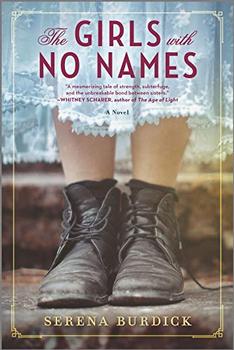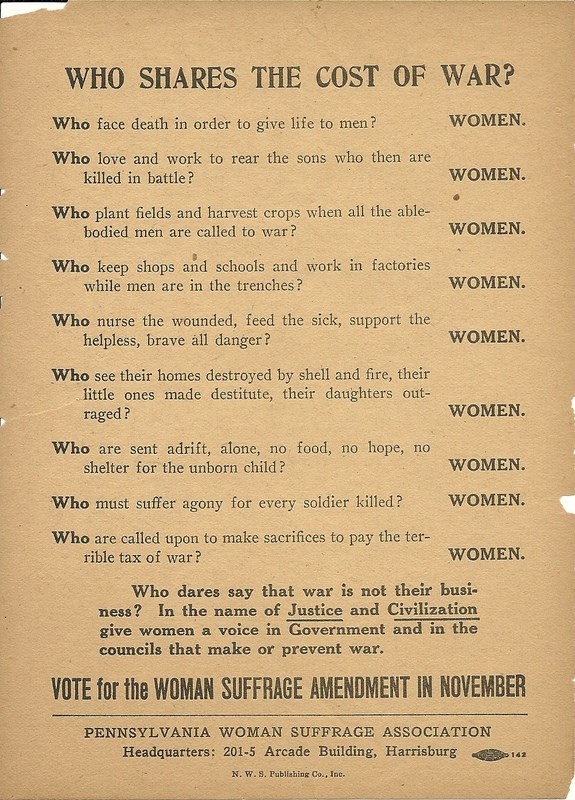Summary | Excerpt | Reading Guide | Reviews | Beyond the Book | Read-Alikes | Genres & Themes | Author Bio

This article relates to The Girls with No Names
 Serena Burdick's The Girls with No Names is set amidst a quiet yet fierce swell of social unrest that builds as we move towards the book's climax. Though the official inception of the US suffrage movement is typically traced back to a women's rights convention held in Seneca Falls, New York, in 1848, it reached a fever pitch in the early 1900s. Finally crossing into mainstream public consciousness, the campaign could no longer be ignored by the men who preferred women to be seen and not heard.
Serena Burdick's The Girls with No Names is set amidst a quiet yet fierce swell of social unrest that builds as we move towards the book's climax. Though the official inception of the US suffrage movement is typically traced back to a women's rights convention held in Seneca Falls, New York, in 1848, it reached a fever pitch in the early 1900s. Finally crossing into mainstream public consciousness, the campaign could no longer be ignored by the men who preferred women to be seen and not heard.
Early women's rights activism had been focused largely on the desire for social autonomy and improved working conditions, with women increasingly taking to the streets in female-only strikes and marches. With male politicians proving apathetic towards their requests, it became clear that women would need to invoke change from inside the system itself. In short, to have any hope of fueling necessary change, they needed to secure the right to vote.
By the turn of the 20th century, the fight for suffrage was helmed largely by two prominent organizations: The National American Woman Suffrage Association (NAWSA), led by Carrie Chapman Catt, and the National Woman's Party (NWP), led by Alice Paul. The former focused on peaceful, legislative measures, seeking to enfranchise women on a state-by-state basis, and repeatedly calling on President Woodrow Wilson and Congress to amend the Constitution. The latter group, inspired by the controversial, headline-grabbing approach of their British counterparts, were known for more militant efforts, like picketing and boisterous rallies. They hoped to galvanize younger women into action and gain further publicity for the cause, making it impossible for the president to continue ignoring the issue.
 As was the case with the UK's suffrage movement, it was the coming of WWI that proved to be one of the most pivotal factors in the campaign – if somewhat ironically so. The general consensus was that assisting the war effort and keeping the nation afloat while the men were at battle had to take precedence above all else. Specific suffrage efforts were placed on hold, but public perception changed as women proved themselves patriotic, vital citizens, making sacrifices to see the country through times of hardship. This furthered their campaign for fair representation and equal rights like never before, with many politicians now fearing inevitable backlash from suffragists and their sympathizers if they continued to resist change. Women setting aside their grievances in the name of national security had made it virtually impossible for men to stand behind the old argument that femininity denoted second-class status.
As was the case with the UK's suffrage movement, it was the coming of WWI that proved to be one of the most pivotal factors in the campaign – if somewhat ironically so. The general consensus was that assisting the war effort and keeping the nation afloat while the men were at battle had to take precedence above all else. Specific suffrage efforts were placed on hold, but public perception changed as women proved themselves patriotic, vital citizens, making sacrifices to see the country through times of hardship. This furthered their campaign for fair representation and equal rights like never before, with many politicians now fearing inevitable backlash from suffragists and their sympathizers if they continued to resist change. Women setting aside their grievances in the name of national security had made it virtually impossible for men to stand behind the old argument that femininity denoted second-class status.
Once the dust of war had settled, 1920 saw victory at last for the suffragists. The sanction of the 19th Amendment granted American women the right to vote in democratic elections for the first time. It remains the most substantial extension of voting rights in US history; the culmination of centuries' worth of progress, and the efforts of countless generations of women who refused to be silenced. That's not to say it was a quick fix for all women, however. Black women had long aligned themselves with the efforts of white suffragists, fearing exclusion from any hard-won progress. But African Americans consistently faced violence and hostility in response to their enfranchisement, particularly in the southern states, by those who resented any progress in the recognition of their rights as equal citizens of the United States.
Names like Carrie Chapman Catt and Alice Paul have rightfully gone down in history, but in her novel, Serena Burdick offers a powerful and compelling reminder that the suffering, bravery and resistance of girls on the periphery of society was no less important in furthering the push for equality. History may have forgotten their names, but we must not forget their stories.
Suffrage activists, 1915 courtesy of the Library of Congress
Suffrage referendum courtesy of the National Park Service
Filed under People, Eras & Events
![]() This article relates to The Girls with No Names.
It first ran in the February 19, 2020
issue of BookBrowse Recommends.
This article relates to The Girls with No Names.
It first ran in the February 19, 2020
issue of BookBrowse Recommends.
Your guide toexceptional books
BookBrowse seeks out and recommends the best in contemporary fiction and nonfiction—books that not only engage and entertain but also deepen our understanding of ourselves and the world around us.